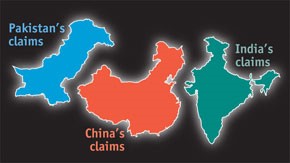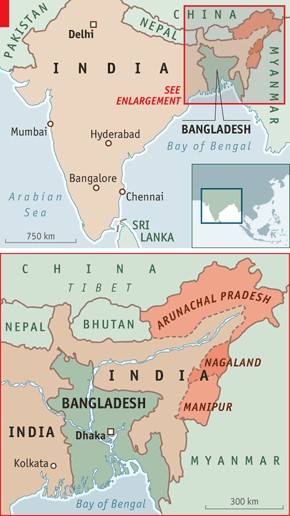

 字體:小 中 大
字體:小 中 大 |
|
|
|
| 2018/03/05 01:13:46瀏覽20|回應0|推薦0 | |
India and BangladeshEmbraceable you Growing geopolitical interests push India to seek better relations nearer homeJul 30th 2011 | DHAKA| from the print edition
NOT much noticed by outsiders, long-troubled ties between two neighbours sharing a long border have taken a substantial lurch for the better. Ever since 2008, when the Awami League, helped by bags of Indian cash and advice, triumphed in general elections in Bangladesh, relations with India have blossomed. To Indian delight, Bangladesh has cracked down on extremists with ties to Pakistan or India’s home-grown terrorist group, the Indian Mujahideen, as well as on vociferous Islamist (and anti-Indian) politicians in the country. India feels that bit safer. Now the dynasts who rule each country are cementing political ties. On July 25th Sonia Gandhi (pictured, above) swept into Dhaka, the capital, for the first time. Sharing a sofa with Sheikh Hasina (left), the prime minister (and old family friend), the head of India’s ruling Congress Party heaped praise on her host, notably for helping the poor. A beaming Sheikh Hasina reciprocated with a golden gong, a post In this section humous award for Mrs Gandhi’s mother-in-law, Indira Gandhi. In 1971 she sent India’s army to help Bangladeshis, led by Sheikh Hasina’s father, Sheikh Mujibur Rahman, throw off brutal Pakistani rule. As a result, officials this week chirped that relations are now “very excellent”. They should get better yet. India’s prime minister, ManmohanSingh, will visit early in September to sign deals on sensitive matters like sharing rivers, sending electricity over the border, settling disputed patches of territory on the 4,095km (2,500-mile) frontier and stopping India’s trigger-happy border guards from murdering migrants and cow-smugglers. Mr Singh may also deal with the topic of trade which, smuggling aside, heavily favours India, to Bangladeshi ire. Most important, however, is a deal on setting up a handful of transit routes across Bangladesh, to reach India’s remote, isolated north-eastern states. These are the “seven sisters” wedged up against the border with China. On the face of it, the $10 billion project will develop poor areas cut off from India’s booming economy. The Asian Development Bank and others see Bangladeshi gains too, from better roads, ports, railways and much-needed trade. In Dhaka, the capital, the central-bank governor says broader integration with India could lift economic growth by a couple of percentage points, from nearly 7% already.
Our interactive map
India has handed over half of a $1 billion soft loan for the project, and the money is being spent on new river-dredgers and rolling stock. Bangladesh’s rulers are mustard-keen. The country missed out on an earlier infrastructure bonanza involving a plan to pipe gas from Myanmar to India. China got the pipeline instead. Yet the new transit project may be about more than just development. Some in Dhaka, including military types, suspect it is intended to create an Indian security corridor. It could open a way forarmy supplies to cross low-lying Bangladesh rather than going via dreadful mountain roads vulnerable to guerrilla attack. As a result, India could more easily put down insurgents in Nagaland and Manipur. The military types fear it might provoke reprisals by such groups in Bangladesh. More striking, India’s army might try supplying its expanding divisions parked high on the border with China, in Arunachal Pradesh. China disputes India’s right to Arunachal territory, calling it South Tibet. Some Bangladeshis fret that if India tries to overcome its own logistical problems by, in effect, using Bangladesh as a huge military marshalling yard, reprisals from China would follow.
Such fears are not yet widespread. Indeed, India has been doing some things right in countering longstanding anti-Indian suspicion and resentment among ordinary Bangladeshis. Recent polling by an American university among students found a minority hostile to India, whereas around half broadly welcomed its rise. A straw poll at a seminar of young researchers at a think-tank in Dhaka this week suggested a similar mood—though anger remained over Indian border shootings. For India, however, the risk is that it is betting too heavily on Sheikh Hasina, who is becoming increasingly autocratic. Opposition boycotts of parliament and general strikes are run-of-the-mill. Corruption flourishes at levels astonishing even by South Asian standards. A June decision to rewrite the constitution looks to be a blunt power grab, letting the government run the next general election by scrapping a “caretaker” arrangement. Sheikh Hasina is building a personality cult around her murdered father, “the greatest Bengali of the millennium”, says the propaganda. Elsewhere, the hounding of Muhammad Yunus, a Nobel laureate and founder of the Grameen Bank who briefly flirted with politics, was vindictive. Similarly, war-crimes trials over the events of 1971 are to start in a few weeks. They are being used less as a path to justice than to crush an opposition Islamic party, Jamaat-e-Islami. It hardly suggests that India’s ally has a wholly secure grasp on power. A tendency to vote incumbents out may yet unseat Sheikh Hasina in 2013, or street violence might achieve the same. She would then be replaced by her nemesis, Khaleda Zia, of the opposition Bangladesh Nationalist Party. Mrs Zia’s family dynasty, also corrupt, is as against India as Sheikh Hasina’s is for it. But India’s habit of shunning meetings with Mrs Zia and her followers may come to look short-sighted. When he visits Bangladesh in September, Mr Singh, the Gandhi family retainer, would do well to make wider contact if India’s newly improving relations are not one day to take another big dive for the worse. from the print edition | Asia
Embraceable you Jul 29th 2011, 16:47
From this article we can see Indias prime minister Manmohan Singh’s strong will to be the No.1 power of the Asia and surpass China and Japan. The high economic growth is accompanying multilateral relation of her neighbors. With profound insight, this experieced strategic elephant is walking toward the superpower in Southern Asia.
After the war against Pakistan fifteen years ago, India few thinks that weapon can deal with problem, so they now show the friendly face of many sides. China is competing with India more drastically. In 2012-2013, Le Ke-Qiang and Rahul Gandhi will hand over the incumbent prime minister Wen Jia-Bao and Manmohan Singh. If we see these two successors’ biography, China still has more advantages than India. Both of these two rising power will be more and more important in the world. Bangladesh’s concern is one part of these. In addition, India’s apparent intention to expand herself will let U.S., China and Japan’s position be changed. We can expect the series of exciting film inclusive of both competition and co-operation in this decade.
Recommended 55 Report Permalink 這裡所提是印度的女總統Sonia Gandhi和孟加拉總理Sheikh Hasina的敦睦之舉,她們的父執輩也是世交。原文作者也提到了印度與巴基斯坦,中國的邊境糾紛問題,在此經濟學人編輯也一併提出。相對於喀什米爾為主的這邊境問題,印孟雙方可說是和諧多了。
印度的和中國及日本的亞洲爭霸最早是2004年的時候由紐約時報提出:"印度的大夢想",筆者是從2005年初聯經出版的「紐約時報英文解析 (1)」之中所得的,印度有超過五年的7%年成長率的可能,形成契機。2005年12月27日在英國金融時報Lex專欄,從當時印度總理辛格的7.5%政績及喊出10%的超越中國的經濟成長率9-9.5%很吸引外資,雖然還沒有足夠成熟的公共建設,但孟買的金融市場比中國上海深圳發達。中國彼時年增2,780億美元,成為第四大經濟體。近一年前當年美國歐巴馬總統和辛格的會談很熱絡,同盟緊密讓中國的對外關係略為吃緊仍然記憶猶新。筆者很希望仍然注意和平誳起的原則而寫,當時本以為2013年印度國大黨仍會繼續執政。 |
|
| ( 心情隨筆|心情日記 ) |












